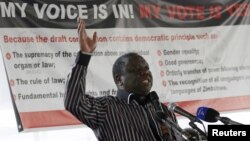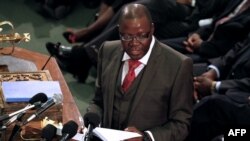HARARE —
Bickering over Zimbabwe's proposed new constitution is reducing chances the government will comply with a court ruling to hold national elections by March 31.
Practically speaking, a new constitution must come before new elections in Zimbabwe, because southern African leaders want to ensure the elections are credible.
A committee submitted a draft constitution to parliament last July, but Zimbabwe’s main political parties have yet to agree on what changes to make before the charter is put before voters in a referendum.
Zimbabwe’s Minister of Constitutional and Parliamentary Affairs, Eric Matinenga, says he cannot say when the referendum might be held.
“I really wish I could tell. The earlier we have a constitution, the earlier we have a referendum. If we had a constitution maybe this week or next week, it means that we immediately go to parliament and we go for a referendum immediately thereafter,” he said.
Disputes between main parties
Zimbabwe's constitution-making process is at an impasse because of disputes between the main parties in the coalition government - President Robert Mugabe’s ZANU-PF party and Prime Minister Morgan Tsvangirai’s Movement for Democratic Change (MDC).
The parties disagree on a proposed reduction of presidential powers and the inclusion of gay rights laws, among other things. As a result, Zimbabwe is unlikely to meet a court ruling to hold national elections by 31 March.
McDonald Lewanika heads the Crisis in Zimbabwe Coalition. He says there are other factors which will make an election by the end of March unlikely.
“We had heard of an accelerated calendar with regards to election preparation processes," said Lewanika. "That has not taken place. And more importantly, the conditions that are supposed to be there to ensure that this election process is free and fair are nowhere being achieved; a case in point is the constitution-making process which is basically in limbo at the moment.”
Matinenga has been leading discussions aimed at narrowing differences on the constitution. He says areas of disagreement have gone down from more than 30 to about five since July of last year. He says he wants the issue settled soon.
“I really think the people out there are tired. I am tired too. I think the next two weeks will give us an indication as to where we are going in terms of the constitution,” said Matinenga.
Even if areas of disagreements are solved, it is unlikely that Zimbabwe will have elections by March since the constitution requires a 90-day notice before voting can take place.
No funds for elections
And there is another hurdle to jump over: money. Last month Zimbabwe’s finance minister Tendai Biti said the country did not have funds for the referendum and the elections.
“2013, the biggest challenge is funding the elections and the referendum," he said. "It is clear that our resources are not going to be enough. It is quite clear that the international community has to come in for assistance.”
The Zimbabwe Electoral Commission has asked for nearly $200 million to hold the referendum and the elections. Earlier this week, Biti said he had released $1 million to ensure voter registration begins.
Practically speaking, a new constitution must come before new elections in Zimbabwe, because southern African leaders want to ensure the elections are credible.
A committee submitted a draft constitution to parliament last July, but Zimbabwe’s main political parties have yet to agree on what changes to make before the charter is put before voters in a referendum.
Zimbabwe’s Minister of Constitutional and Parliamentary Affairs, Eric Matinenga, says he cannot say when the referendum might be held.
“I really wish I could tell. The earlier we have a constitution, the earlier we have a referendum. If we had a constitution maybe this week or next week, it means that we immediately go to parliament and we go for a referendum immediately thereafter,” he said.
Disputes between main parties
Zimbabwe's constitution-making process is at an impasse because of disputes between the main parties in the coalition government - President Robert Mugabe’s ZANU-PF party and Prime Minister Morgan Tsvangirai’s Movement for Democratic Change (MDC).
The parties disagree on a proposed reduction of presidential powers and the inclusion of gay rights laws, among other things. As a result, Zimbabwe is unlikely to meet a court ruling to hold national elections by 31 March.
McDonald Lewanika heads the Crisis in Zimbabwe Coalition. He says there are other factors which will make an election by the end of March unlikely.
“We had heard of an accelerated calendar with regards to election preparation processes," said Lewanika. "That has not taken place. And more importantly, the conditions that are supposed to be there to ensure that this election process is free and fair are nowhere being achieved; a case in point is the constitution-making process which is basically in limbo at the moment.”
Matinenga has been leading discussions aimed at narrowing differences on the constitution. He says areas of disagreement have gone down from more than 30 to about five since July of last year. He says he wants the issue settled soon.
“I really think the people out there are tired. I am tired too. I think the next two weeks will give us an indication as to where we are going in terms of the constitution,” said Matinenga.
Even if areas of disagreements are solved, it is unlikely that Zimbabwe will have elections by March since the constitution requires a 90-day notice before voting can take place.
No funds for elections
And there is another hurdle to jump over: money. Last month Zimbabwe’s finance minister Tendai Biti said the country did not have funds for the referendum and the elections.
“2013, the biggest challenge is funding the elections and the referendum," he said. "It is clear that our resources are not going to be enough. It is quite clear that the international community has to come in for assistance.”
The Zimbabwe Electoral Commission has asked for nearly $200 million to hold the referendum and the elections. Earlier this week, Biti said he had released $1 million to ensure voter registration begins.

